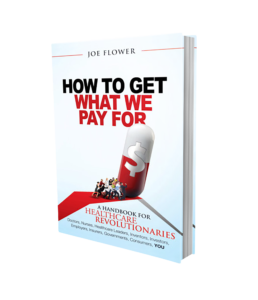“How do I get the new book?”
Order it at Amazon at this link:
“So What’s This All About?”
It’s no longer a secret. The questions are: “How?” and “Who?”
- How are we getting from volume to value in healthcare?
- How do we make sure we get what we’re actually paying for — good care, at an affordable price?
- Who’s doing it now?
- Who’s going to win at this game in a shrinking market?
- Are you?
There’s no point fooling ourselves. The revolution is happening now, we’re already starting to do it. Some are figuring it out, but most are not.
That’s why I’ve written the handbook on how to do it:
The path to a new system, based on value and fairness is now much clearer, and the tipping point, when enough change has happened to force the rest of the system to snap into a new shape, is a lot closer than you think.
In my new talks and consulting and in my new book, I show you how each constituency has a role to play in making this revolution happen soon enough for most of us to enjoy it. I show you exactly what your role is turning out to be.
“What Will I Get From Reading the Book?”
- The Big Picture – how we got to this historic moment, what really makes healthcare so expensive
- The lessons being learned by fast movers on the front lines of change
- The framework for change, which is the 7 Levers of Change and the action steps.
- Checklists
- Resources
- This is truly a manual.
It’s all based on what the revolutionaries are actually doing now, what they’re learning, and how they can save you a whole lot of trouble, maybe even your career.
If you’re already in this fight, or if you want to be, I can show you whom to learn from and how to find allies. You don’t have to be alone in this. In fact, when you find your allies, it starts to feel like something worth doing, something exciting. Something to be proud of. And it is.
That’s because this new kind of healthcare is not about rationing and cutbacks and takeaways. It’s not about getting less. It’s about:
- more,
- smarter healthcare,
- earlier healthcare,
- friendlier healthcare,
- where you need it,
- when you need it,
- what you really need.
It’s about healthcare you can feel safe and proud to offer your children and your communities, healthcare that doesn’t steal your house or your car because you can’t afford to pay, and when you’re most vulnerable.
How? Well, the answer is mostly not in Washington, it’s not conservative or liberal. Because the answer is mostly not about who pays for healthcare. The answer is mostly about who we pay, and what we pay them for.
This is a critical time in the history of healthcare in the U.S. and in many places around the world. Healthcare costs are rising everywhere. I’ve been speaking in the U.S., Canada, Europe, Asia, the Emirates; we have similar problems: How to get healthcare costs down and still get much better results.
There are certainly many ways to screw up this great opportunity for change. I can show you who’s winning and who’s losing and why. But what I’d most like to show you are the real, demonstrably successful ways to make the Next Healthcare work for your organization, your community. Order the book here.
“What do you mean, Revolutionaries?”
If you’re inside the belly of the beast, that is, today’s healthcare industry, you know that there is truly a revolution underway, you just may not have been calling it that.
If you’re not inside today’s healthcare industry, you’ve likely still been bruised and battered by the old model for doing business in healthcare.
Now there’s the revolution of volume to value: instead of doing business on a fee-for-service basis, we’re moving to an economy based on outcomes. Many have been trying to ignore this seismic trend.
The revolutionaries are the one who have been grabbing whatever tools they can find and are rebuilding their business models and organizations like there is no yesterday. If you’re not already doing this, you may be wondering how you can. Here’s how. In the book.
“Isn’t healthcare a giant, lumbering colossus that will never really change all that much?”
That’s one of the key points here. There is a tipping point and it’s a lot closer than you think.
Anyone who has studied business and change, as I have for 35 years, knows that to move an economy past the breakpoint, forcing the whole industry to adapt to the new regime, you only have to push it about 15% or 20% of the way. That’s just the way complex adaptive systems work.
Once a significant fraction of the healthcare economy is competing at a much lower price point with much better results, which some revolutionaries are actually doing, the rest will have to follow suit, or find little niches.
“How can all those people in your title be revolutionaries?”
Every single group here already has a lot to win, a lot to lose, and, yes, a lot to do in this fight. If you don’t believe me now, read the book, How to Get What We Pay For: A Handbook for Healthcare Revolutionaries: Doctors, Nurses, Healthcare Leaders, Inventors, Investors, Employers, Insurers, Governments, Consumers, You.
Then talk to me.

